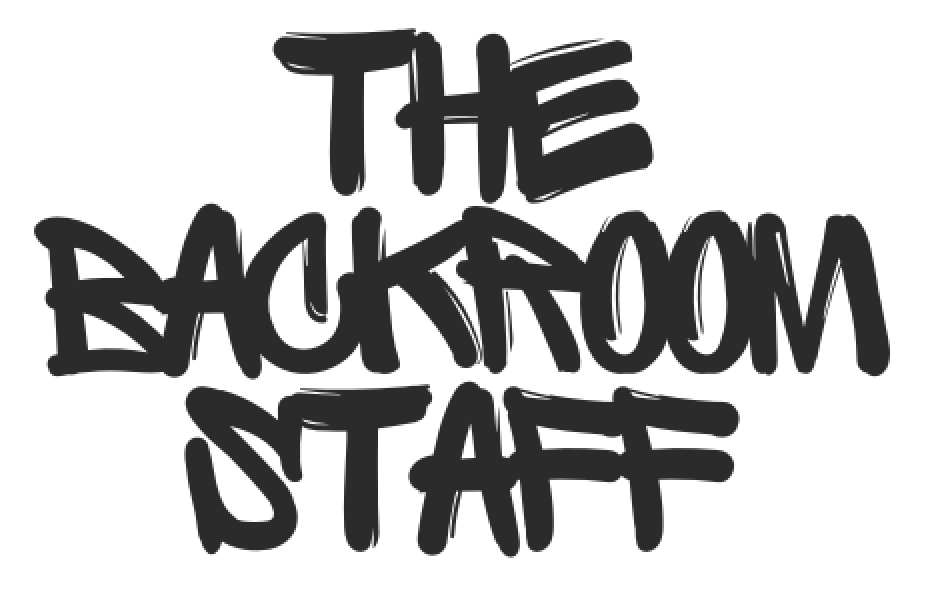Football clubs invest millions in the global search for talent, yet East Africa remains one of football’s most overlooked regions. While West and North Africa have long been represented in the world’s biggest leagues, East Africa has struggled to gain similar recognition. In South Sudan - the world’s youngest nation - the challenges are even greater.
Bidali Henry, managing director of Future Stars Football Academy (FSFA) in Juba, is determined to change this. His work goes beyond training players; it’s about building pathways and creating opportunities for young talent in South Sudan and across East Africa.
Despite the obstacles, FSFA has made remarkable strides in just a few years, developing dozens of players who have gone on to represent South Sudan’s youth national teams. This year, one of their rising stars, Lazarus Laku, was selected by the senior national team for South Sudan’s World Cup Qualifying matches just weeks after his 16th birthday! For Bidali and his team, however, this is just the beginning of a much larger mission.
The interview has been condensed and lightly edited for grammar and clarity.
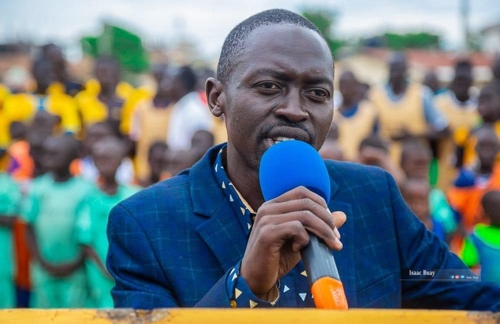
[ Starting Future Stars Football Academy ]
I played in my school time and in the community. I saw how football brings people and communities together, especially for young people and their families and gives people a chance to move up social groups.
Then in 2019, I started trying to support a local club in South Sudan but they had some issues with registration and bureaucracy. I created a concept for an academy and shared this with one of my connections - a South Sudanese-American. He asked me why I wanted to start a new academy - our country has been going through a series of conflicts and we want to give the young people hope and inspire change.
He said we shouldn’t establish a new academy but instead take over the academy of his former coach and set up organizational and administrative systems. I became managing director and he’s helping from the US. We changed the name from Young Stars Soccer Academy to Future Stars Football Academy and began work!
I do a lot of the administrative and strategic work as well as a lot of work finding sponsorships and looking after our finances. We are always looking for partnerships and sponsors that will give us the resources to fund projects to help us improve. I also engage in proposal writing relevant to sports projects.
Now, we have around 100 players across 5 age groups from under 10 to under 19. We have started to build partnerships and engage with people internationally. We’ve produced many players who have played in the national teams at U15, U17 and U20 level and even a couple that have been called into the senior team.
We also have a player who is already in the US, through a program run by one of our former national team players. This gives our young players an opportunity to receive scholarships and attend university.
We are building infrastructure and methodologies for player development and player pathways. There are a lot of challenges compared to other nations. There are lots of different dynamics, some of these players have been in refugee camps - we are building social cohesion and trying to promote them and give them opportunities at a higher level.
This is how we work - we’re changing the narrative for young players in the country.
"our country has been going through a series of conflicts and we want to give the young people hope and inspire change"
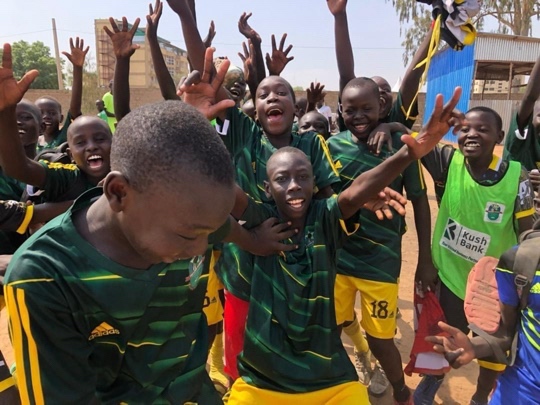
[ Is there a school (or boarding school) component to the academy? ]
All academies here are non-residential due to the lack of resources and funds. In the future, we plan on having a residential academy where we train, study and grow. This will help our players to study and also play soccer.
[ Do you have girls’ teams as well? ]
Yeah, we like to bring them in and mix up with the boys. We have girls coming to the academy and training but it’s difficult because often they can’t commit to coming regularly. There are still some cultural barriers where women in some cultures are not encouraged to play football. If they come and want to get training we accept them, we give them the opportunity. This is part of our social responsibility and commitment. However, we still don’t have a specific girls’ program.
[ Do you get any support from the South Sudan FA or CAF? ]
Not much from the FA or CAF but there’s grassroots funding from FIFA. Their support comes in terms of project development and maybe some equipment. However, we have to do our part (on our own) to develop players. We can’t just wait for the FIFA funds.
[ Is the ‘business model’ of the academy reliant on transfer fees/players moving to bigger leagues? ]
Yes, that is a key part of our future plan. These funds - from transfers and sell-on fees - can lead to the sustainability of the whole project. We are building connections and developing these pathways for our players now.
[ Where are the existing pathways for South Sudanese players to move abroad? ]
Currently, there is no direct link for South Sudanese players. However, many European scouts have watched games here and have an interest in South Sudanese players. Players (in South Sudan) have lots of resilience. That’s one thing you know, when they come to the pitch, they come hungry! And this is a really handy attitude for becoming a super talent. If you take such a player to Europe or America, as we have, where there’s food, supplements, facilities, you have a complete player!
We’re working on creating these pathways. In Europe, we’ve had some interest from Sweden and Germany and are working to create connections with clubs there. We’ve also had interest from the US. We’re always contacting people and now, we’re making plans for 2025 and beyond.
But, ‘traditionally’, European clubs don’t believe in East African players, they only believe in West Africa - Ghana, Nigeria, Ivory Coast, Senegal, etc. I know it’s because of the likes of Mané, Didier Drogba and many others who had lots of success in Europe, but there are talented players here, the issue is finding the pathways. We’re trying our best to link up with agencies, scouts and clubs to connect with the players here.
[ Do you take the youth teams abroad for tournaments or matches to increase their exposure? ]
Yes, definitely. In 2019, we participated in a big tournament in South Korea. Then in 2022, we were invited to a tournament in Norway - unfortunately, our visas arrived too late and we couldn’t travel. This is a big problem here, as there’s no embassy here and we were asked to travel to Nairobi for the biometrics, the application and the appointment!
After this, one of our sponsors saw how disappointed the boys were about not traveling and getting the chance to play football and be scouted so, we organized some matches in Uganda with other academies. We want to do this more often.
[ What are some of the biggest challenges to producing professional footballers in South Sudan? ]
There are several aspects, from the infrastructure to the human capacity. To develop a professional player, you need the right infrastructure and pathways. There are good talents but they don’t have opportunities.
One issue is that after playing at academy level, there’s nowhere to progress. Either they go to a local club, maybe they play for one or two years and they drop off - or they stop right away. So it’s difficult to create a sustainable career for the players.
The level of coaching is another challenge, especially as we’re moving into a more digital world - we need to improve a lot. Hopefully, as more people use this new technology, it will become easier, but it will take time.
Another issue is the socio-economic status in South Sudan. I’ve had scouts ask me if it’s possible for them to come to South Sudan, yes, it’s possible! But many think because of the indicators, the economic indicators - they will just be wasting their time here and never find any talents.
The other challenging issues are players' health and nutrition. There are limited personnel trained in dealing with players' health and nutrition. If a club doesn’t have a nutritionist, physio and medical doctor then it’s challenging to bring up healthy players who can give 100% performances on and off the pitch. It also increases the level of injuries that are detrimental to a player’s development.
Football in South Sudan lacks investment from multinational companies, organizations and the government. Recently, the government of South Sudan organized a Sports Financing Conference where there were many companies and stakeholders. Our basketball team is one of the best in Africa and is sponsored by one of the big telecom companies, for example. It would be great if they start doing the same in football and in other sports!
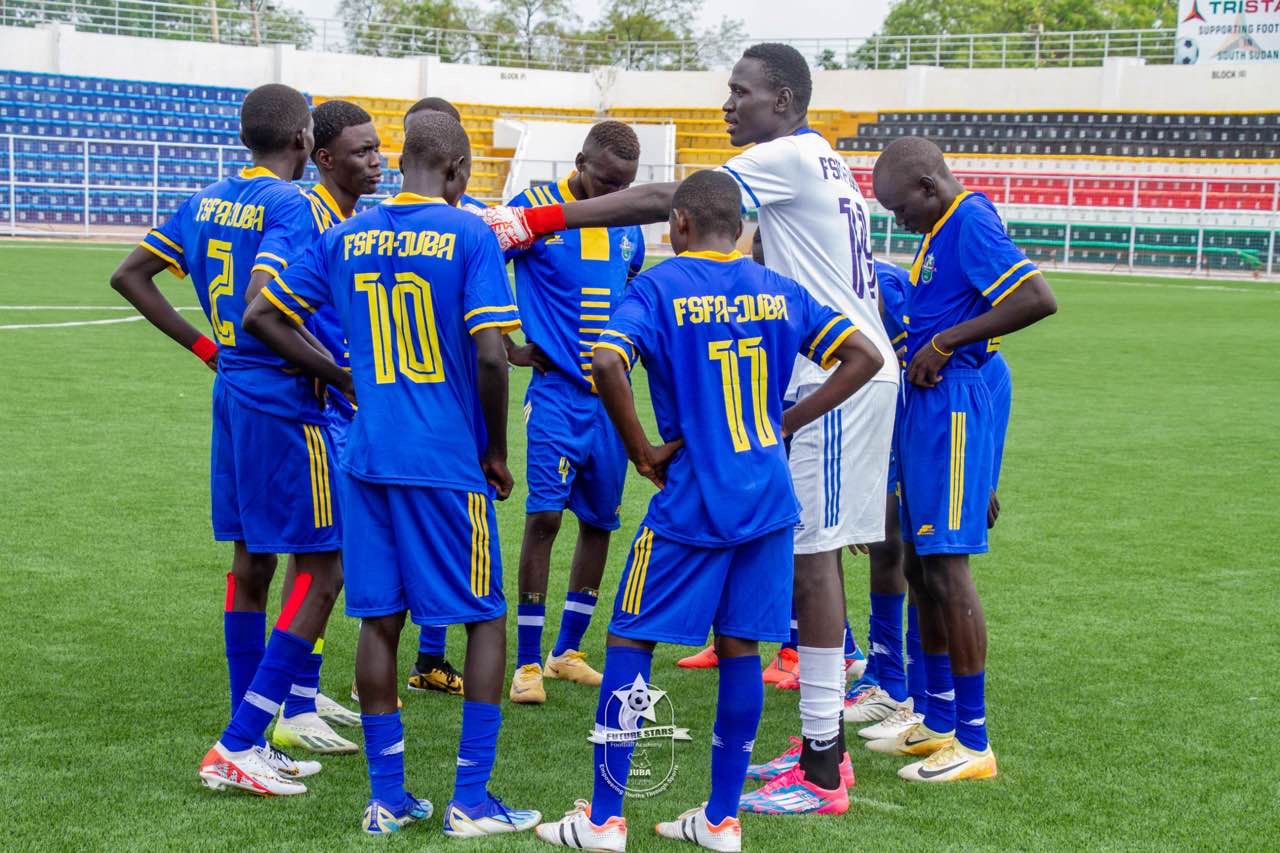
[ What does the coaching education path look like in South Sudan now? ]
This is a big problem - education is very important! If you have a good teacher, it will have a multiplying effect, producing good students who can become good leaders. It’s the same for coaching!
The coaching licenses are run by CAF, we have CAF D, then C, B, A and Pro - these are the CAF licenses. However, they only come once in a while (to run a course) and some countries don’t qualify for some of the licensing. Right now, for example, South Sudan has not done CAF A, but only up to CAF B.
Some of the coaches go to neighboring countries like Uganda, Sudan or Kenya for a course. We have a few coaches in the country with the A license.
So we are looking at this and seeing how we can have more hands-on training to improve the knowledge of the coaches because we know the impact it can have on the players.
"If you have a good teacher, it will have a multiplying effect, producing good students who can become good leaders"
[ You mentioned the basketball team, of course, they’ve become quite famous after their performance in the Olympics in the summer - are there things from their success that can be replicated by South Sudanese football? ]
In basketball, we have a legend, Luol Deng, who played in the NBA and became the coach and also the president of the basketball federation. Playing for big teams in the NBA has opened many paths for him back home.
If we have players who play in European football or MLS, this influence from Luol Deng in basketball can be replicated and they will have more influence to impact football.
It’s about resources - he has the Luol Deng Foundation that works with partners in the US, in Europe, and in the UK. He has really done a lot of work in a very short period of time - in just 2, 3 years, the team is competing at the highest level, beating big teams in Africa and losing by just one point to the US!
To conclude, if football is given the financial resources - like what Luol Deng has invested (in basketball), we can get to a situation where South Sudanese football can produce the required talents who would compete.
[ I saw in many of your pictures players playing on dirt pitches - can you talk a little about the facilities in South Sudan? ]
We play on rough pitches!
I was telling a scout recently that the benefit of producing players who can control the ball easily on the rough ground - when they get to a nice pitch - it's no problem for them!
Honestly speaking, we have two ‘real’ pitches. We have one training pitch that is being funded by FIFA and then, the national stadium. These are artificial pitches. Sometimes we play matches or tournaments on these pitches but we don’t have many. When I saw the Norway Cup, they had 30 or 40 fields for just that one tournament!
We’re still working on the infrastructure but this is part of our plan.
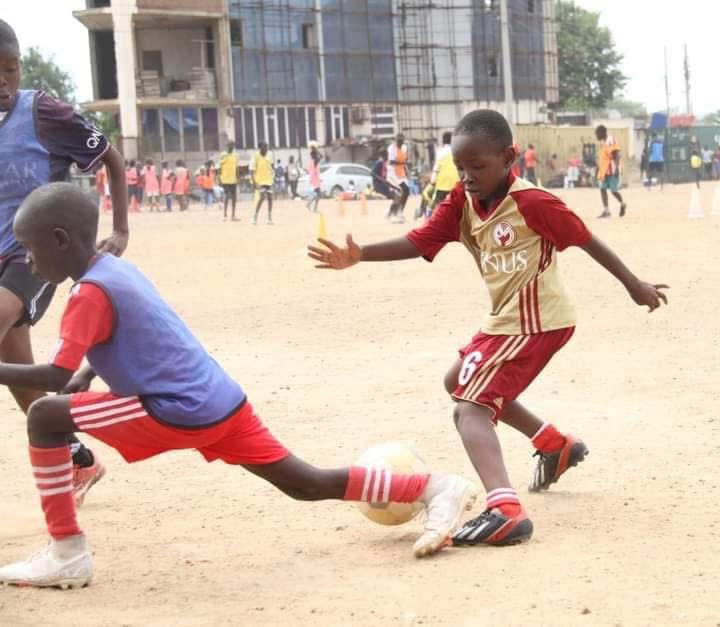
[ What are some of the longer term goals for Future Stars Football Academy? ]
Our long term goal is to establish a residential academy with modern facilities where we can accommodate not only South Sudan’s young talent but also from neighboring countries and produce professional players.
We also want to increase our network, to have more sponsors and more scouts coming into the country from Europe and the US to watch our players. A lot of this depends on the social and political landscape in the country.
